Mental health program provides therapy, case management, resources to children and families
By JULIE MINDA
SANTA MONICA, Calif. — It is rug time at the therapeutic preschool at the Child and Family Development Center.
About a half dozen children gather in a semicircle around mental health rehabilitation specialist Denise Sweeney to talk about how they're feeling today. They can select a "happy face," "sad face" or "mad face" out of a stack of placards.
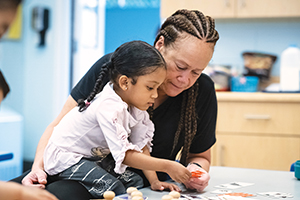
Jenon Lee, a therapeutic child specialist, works with Desiree Harrington in the Day Treatment Intensive Therapeutic Preschool program at Providence Saint John's Health Center's Child and Family Development Center. The center in Santa Monica, Calif., provides behavioral health and mental health services to low-income families who might otherwise be unable to access care.
David Crane/©CHA
"I'm feeling happy," says one child as she retrieves a smiley face.
"Why are you feeling happy?" asks Sweeney.
"Because mommy came to see me today," says the girl. Sweeney mirrors the girl's joy, demonstrating emotional engagement and empathy for her young charges as she does so.
One by one, the children share the reasons for the emotion that dominates their psyches this morning. All of the children have behavioral issues that can manifest in emotional outbursts or extreme withdrawal. Sweeney helps the children to process complex emotions and experiences. In this exercise, called community meeting time, she does so by simply modeling how to identify and speak about feelings.
Many of the children who attend the therapeutic preschool or receive therapy at the center have experienced trauma and upheaval that has derailed their sense of safety and well-being. They may have witnessed or suffered violence at home. They may be living in a foster home or shelter. They may manifest their anxiety, frustration and powerlessness by lashing out or shutting down.
They and their families have been referred to this center to receive intensive intervention, to heal from their trauma and begin a new trajectory.
The Day Treatment Intensive Therapeutic Preschool is one of nearly a dozen programs and services offered for children and their families, and for adults at the Child and Family Development Center, which is part of Santa Monica's Providence Saint John's Health Center. The mental health facility's focus is on children and parents in low-income families, including immigrant families.
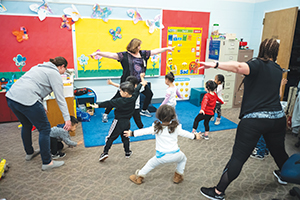
Denise Sweeney, a mental health rehabilitation specialist, leads yoga exercises at the Day Treatment Intensive Therapeutic Preschool at Providence Saint John's Health Center's Child and Family Development Center. David Crane/©CHA
The center's annual budget is about $5 million. Its main source of funding is Medi-Cal, California's Medicaid program. Other funding comes from Providence St. Joseph Health's Well-Being Trust, Providence Saint John's community benefit division, private donors, the city of Santa Monica, Los Angeles County, the Atlas Family Foundation, the Carl and Roberta Deutsch Foundation, the Robert Wood Johnson Foundation and other grantors.
Services include mental health assessments, individual therapy, group therapy, workshops on parenting and other topics like nutrition, and social services case management and advocacy for individual families.
While the building on the hospital campus is the service hub, the Child and Family Development Center functions as a "clinic without walls," with staff often providing services and outreach to preschools; elementary, middle and high schools; community centers; churches; and clients' homes in western Los Angeles County.
Sweeney says one of the therapeutic goals of the programs is to help children and their families adopt healthy ways to relate to and emotionally support one another. "Seeing a child leave our program with the confidence and the ability to trust others to care for and help them is very rewarding," she says. "It's also fun watching the children grow into their very own unique selves."
Trauma history
The center's young clients, including the children in the therapeutic preschool, may exhibit anxiety, depression, attention and hyperactivity disorder, aggression or developmental delays. They may have impaired social interaction skills: they may not play well with other children, and may be verbally or physically aggressive toward them, for example. Lara Sando, the program coordinator for the center's Early Childhood Assessment and Treatment program, says in many cases the conditions relate to trauma.
Most clients come from families where successive generations have experienced trauma, often linked to substance abuse, domestic violence, criminal behavior and parental negligence. Many clients are minorities who have suffered institutional racism, oppression and disenfranchisement, says Jordyn Levine, a social worker in the center's Families and Schools Together program.
New direction
To aid each client, including young children, adolescents and adults, the center staff begin with a comprehensive assessment of psychological, emotional and behavioral health, as well as socioeconomic need. Treatment plans developed in partnership with the client and family can include individual therapy, family therapy, group therapy, speech therapy, social work case management and educational sessions and workshops.
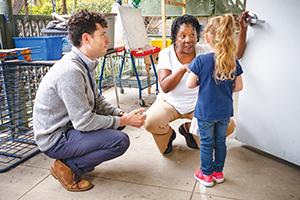
Matthew Ruderman, a clinical psychologist at the Child and Family Development Center, and preschool teacher Barbara Vick squat down to get on a student's eye level at Washington West Preschool in Santa Monica, Calif.
When the client is a child or adolescent, center staff work with all members of the immediate family, aiming to get at the root of the dysfunction that is contributing to the child's mental health issues, says Sando. Evangeline Bishop, coordinator for the center's Partnerships for Families Program, says the focus is on increasing the secure attachment between family members and helping parents or guardians to master parenting skills; and break from unhealthy patterns and responses they may have learned from their own parents.
The parents in the program get lots of positive reinforcement for loving their children enough to make changes and for all the other things they do right.
When clients attend schools in the community, center staff reach out to their teachers with support and information.
Outreach
The grant-funded Early Childhood Assessment and Treatment program is one of the vehicles bringing the center's mental health assessment and treatment services into the community. What began as a small pilot to extend preventive mental health services to select preschools has expanded to all the public preschool sites in the Santa Monica-Malibu Unified School District.
Staff visit each of the preschools, interacting with all of the children and giving special attention to those with pressing mental health needs, including those whose formal assessments have surfaced mental health conditions and those whose teachers or parents have flagged as needing extra care.
Center staff give teachers tips for modifying problematic behaviors and making inroads with individual children. They arrange meetings with parents to provide advice, so the child gets consistent behavioral cues and refinforcement from teachers and parents.
On this April morning in Santa Monica, center consultant Matthew Ruderman talks with Washington West Preschool teacher Barbara Vick about a student who's been acting out. Ruderman tells Vick that he's had conversations with the parents about how to maintain consistency between school and home, including by being explicit about expectations. He says his conversations with the student, parents and school staff suggest to him that the child's behaviors are a front for anxiety and fear, and the child needs safety through structure.
Vick says Ruderman's insights are invaluable to her efforts to prepare kids with pronounced behavioral concerns to learn and thrive in school.
Success
Staff say the Child and Family Development Center has helped thousands of families around west Los Angeles County to break harmful relational patterns, manage serious mental health concerns, get treatment to overcome harmful addictions, recover from disabling trauma and gain control of their circumstances.
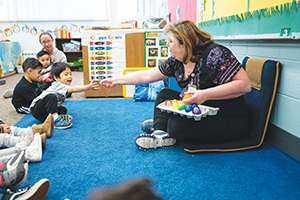
Denise Sweeney rewards Thomas Pacheco's participation in a regular therapeutic preschool exercise where children learn to identify their emotions.
One of those helped by the center is an eighth-grade student at a west Los Angeles County middle school. (Her mother asked that the girl's name not be used in this article.) The student came to the center in 2017 — her mother had heard of it through word of mouth.
The girl was extremely anxious and depressed.
In counseling sessions with clinical therapist Grace Rougier, it came out that the girl's life had been unexpectedly uprooted after a family member was arrested. The girl's mother feared there would be retaliation against her family and she packed up her household and moved the family overnight. The girl left her friends and her sense of stability behind. The family never talked about the crime, the uprooting or the emotional fallout and the girl did not have the emotional maturity to process the events and consequences on her own.
Rougier used behavioral therapy to help the girl explore and come to terms with her feelings. She taught her coping and relaxation techniques including mindfulness and the soothing power of taking a stroll with a trusted companion.
Rougier helped her client learn how to talk to her mother and other family members about the reasons for her anxiety and sadness.
The girl says in Rougier she found "someone I could trust. Now I'm expressing my feelings."
Programs of the Child and Family Development Center
- Crisis intervention
- Family therapy
- Child and Youth Development Project, a school-based model
- Families and Schools Together, a school-based program
- Mental health and psychosocial program for people with intellectual and developmental disabilities
- Multidisciplinary assessments
- Therapeutic preschool for children aged 2½ through 5
- Early Childhood Assessment and Treatment program for infants to children aged 5
- Perinatal Wellness Program for pregnant women with mental health conditions
- Partnerships for Families Program, home-based mental health services for families
- Helen Reid Parenting Program, support groups provided at five transitional housing sites
Southern California center provides mental health care for vulnerable families
SANTA MONICA, Calif. — The Child and Family Development Center set out to make quality mental health care accessible regardless of insurance status or ability to pay.
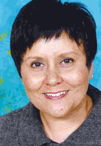
Refuerzo
Center staff credit Rebecca Ritarita Refuerzo, who is retiring this month after 25 years as the center's executive director, with building a program that provides comprehensive, high-quality, evidence-based behavioral health care to all comers, with particular focus on the economically vulnerable. This includes children and families who do not have legal immigration status.
Born in 1949 in California's San Joaquin Valley, Refuerzo grew up in a migrant farmworker family. After her father died, her mother worked low-wage jobs in the food service industry, often bringing home food discarded by the customers to feed her children, according to information from Refuerzo and the center.
As Refuerzo recalls, her mother would scrape discards off people's plates and put it in large cans. She'd ask permission to take the food home "for the dogs," but really, it was for her children.
In 1969, Refuerzo was recruited to the University of California through a program to better the lot of migrant farm families. Drawn to the social work profession's focus on social justice, Refuerzo earned an undergraduate degree in sociology and child development and went on to earn a master's in social welfare from the University of California at Berkeley. She worked in multiple social work and faculty positions before joining the center's staff in 1994.

Victor Cano, left, and Dwayne Davison, center, chat with Child and Family Development Center psychologist Ashley Silvera after a mindfulness training sesson at Olympic High School in Santa Monica.
David Crane/©CHA
Under her leadership, the center's budget grew six-fold and Refuerzo expanded its focus well beyond its original charter for treating children with developmental disabilities. Today, the center's staff of about 100 includes nearly two dozen licensed clinical social workers and licensed marriage and family therapists, 12 psychologists, three psychiatrists, as well as mental health rehabilitation specialists and educational, occupational and speech therapists. All work as part of multidisciplinary teams to help the more than 1,000 families who access the center's services each year.
Lisa Margolis, clinical program manager of early childhood mental health services for the center, says the clinicians have "many additional hours of trainings and certifications that you may or may not find in the private practice world," such as training in Child Parent Psychotherapy, which is trauma treatment.
Ruth Cañas, who will succeed Refuerzo as executive director, says the center has a diverse staff, most of whom speak English and Spanish, a common first language among clients. Other languages also are spoken by staff. Cañas says the center has held positions open waiting for bilingual applicants, based on the belief that it is better to offer services in clients' native language when possible rather than using translation services, which may lose some of the authenticity of direct conversation.
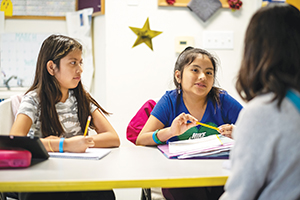
Sophia Flores, left, and Anayelly Cruz talk with Gail Gutierrez at the Neighborhood Youth Association in Venice, Calif. Gutierrez coordinates the Child and Family Development Center's Family and Schools Together outreach program. She builds informal relationships with teachers, students and parents to break through the stigma and distrust that keep people from accessing mental health services.
David Crane/©CHA
Clients are referred to the center through area clinics and schools, churches and community organizations that work with families in need; the Los Angeles County Department of Mental Health and other state and city agencies.
Noa Saadi is program coordinator of the center's Child and Youth Development Project. She and her colleagues go to Santa Monica public schools to deliver center services, such as individual therapy, group therapy, case management and parenting workshops.
Center staff get to know teachers, counselors, students and parents by name. Saadi says this informal relationship building is critical to open the door to community members who might otherwise distrust mental health providers or fear the stigma of seeking mental health services.
She says, "We love being in the schools, as they are an ideal place to provide mental health services to youth. Schools are the natural environment for students."
— JULIE MINDA